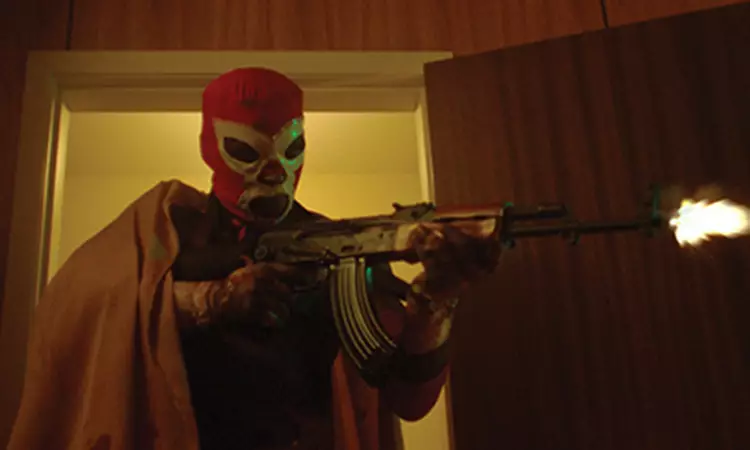Pro wrestling, a blend of athleticism and entertainment, challenges our perception of truth and performance. This dual nature is exemplified in Lowell Dean’s *Dark Match*, which premiered at the Fantasia Film Festival 2024. By intertwining the fantastical elements of horror with the grappling expertise of wrestling, the film pushes the boundaries of genre conventions while exploring deeper social issues.
At its core, wrestling is an art form exhibiting a curious dichotomy. On one hand, it’s a staged spectacle where every punch, slam, and victory is diligently choreographed. On the other, it paints a portrait of raw, unfiltered human strength and determination. With *Dark Match*, Dean plays delicately with this tension, positioning the viewer to reflect on the immersive experience in the ring.
The film opens with a compelling montage of unsettling imagery, combined with a poignant soundtrack that creates a foreboding atmosphere. The usage of an old Walkman by the protagonist, Nic, aka ‘Miss Behave’ takes the audience back to the late ’80s—a time of vibrant pop culture saturated with competing influences. This choice resonates, not just as a nostalgic nod but also as a symbol of her character’s struggles against societal expectations and entrenched obstacles. As she prepares to enter the wrestling ring, the poignant lyrics and beats of the era highlight Miss Behave’s inner conflict between her genuine ambition and the tarnishing effect of racial and gender stereotypes.
Miss Behave’s journey is central to *Dark Match*. Intertwined within the narrative are profound themes about race and gender. The film sharply critiques the wrestling industry’s current opposition to equality, showing how Miss Behave’s character fights against the stereotype of women in the sport. The resistance she faces from her peers and superiors illustrates a nuanced portrayal of the struggles faced by women of color striving for recognition in male-dominated arenas.
The character of Rusty Beans, the sleazy manager, embodies the archaic views within the wrestling world, relegating Miss Behave to the status of a villain while upholding an idealized counterpart, Kate the Great. Through his derogatory remarks, the film unfurls an underbelly of prejudice that sees the portrayal of women in wrestling as part of a scripted narrative, often designed to serve the whims of male spectators. Dean effectively transcends surface-level storytelling by utilizing character interactions to shadow the complexities of race and gender biases that persist in various societal realms.
As the plot unfolds, the narrative shifts towards a darker, more sinister realm. The move from in-ring competition to a life-or-death struggle sets the stage for an encounter with a cult, detailing a twisted storyline that champions horror while upholding the integrity of wrestling. Here, both the characters and the audience are thrust into a battle against a formidable antagonist—a cult leader with a vendetta against the wrestling crew.
This transition is not merely a plot twist but rather a commentary on the lengths to which individuals—especially those who feel marginalized—will go to reclaim dignity. The film culminates in violent confrontations that echo the brutality often associated with the wrestling sport itself, reinforcing the idea that, in their quest for survival, the characters have to confront both internal and external demons. The horrifying cult dynamics draw parallels to wrestling’s own theatrics, mirroring the bloodbath of both the physical and the metaphysical challenges faced by the protagonists.
Integral to the film’s identity is its visual essence, marked notably by a pervasive green hue. This choice of color symbolizes envy and discontent, encapsulating not just Miss Behave’s struggles but also the frustrations held by her peers within the wrestling world. Each character’s journey is marked by a yearning for recognition, making the visual language of *Dark Match* as crucial to its narrative as its script.
Director Lowell Dean’s decision to use a grainy, VHS-like aesthetic harkens back to a time of low fidelity, evoking nostalgia for the past while also indicating the rawness of the subject matter being tackled. This affects the overall ambiance, merging the realms of cult horror and wrestling, creating a unique viewing experience that pays homage to both genres.
As *Dark Match* progresses, Miss Behave evolves from a sidelined character into a fierce anti-heroine fighting for not just her survival but for a larger cause. A wrestling protagonist amidst overwhelming odds, her character embodies hope for a more equitable future—a theme that resonates deeply in current cultural discourse.
Ultimately, *Dark Match* achieves a delicate balance between entertainment and advocacy, employing the captivating absurdity of professional wrestling alongside genuine commentary on societal issues. The film’s refusal to shy away from the disturbing realities of misogyny and racism in the ring, combined with its embrace of horror elements, makes it a significant entry in the realm of genre cinema. With its amalgamation of thrills, social critique, and compelling storytelling, *Dark Match* invites viewers to grapple—not just with its characters but with the very narratives that shape our experiences both in and outside of the ring.

